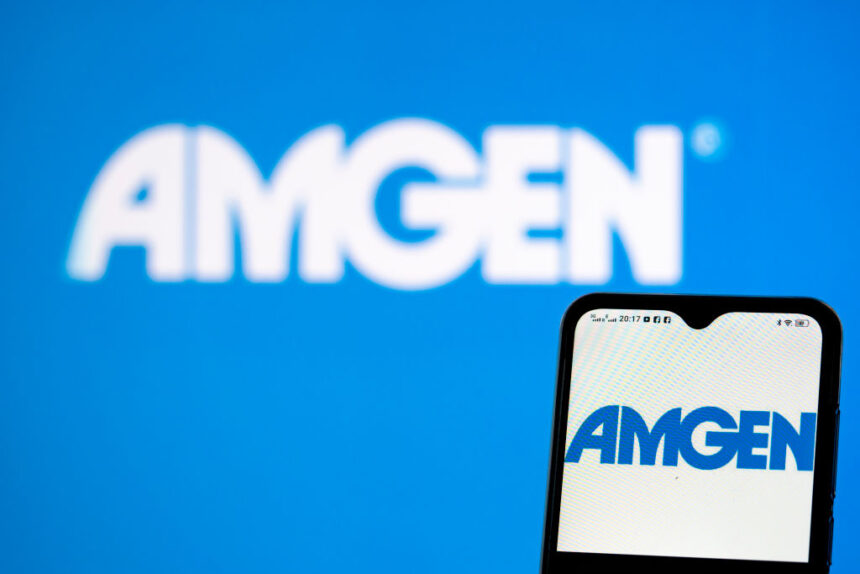Amgen reported topline growth in Q3 while Pfizer posted a quarterly loss, according to financials released Tuesday morning.
Amgen’s total revenue rose 4% to $6.9 billion, thanks largely to 5% growth in product sales. That growth was supported by 11% volume growth due to Blincyto, Evenity and Repatha, and partially offset by 3% lower net selling price and 3% unfavorable changes to estimated sales deductions.
By product, Repatha sales topped $406 million, up 31% year-over-year, while Evenity sales increased 53% to $307 million. Another major contributor was Amjevita, which saw its sales rise 30% to $152 million.
Enbrel still led the way with sales topping $1 billion, even though it had a 6% decrease compared to Q3 2022.
Despite the topline growth, Amgen’s earnings per share (EPS) dropped 19% year-over-year due to a net impairment charge of $650 million following a decision to discontinue development of prostate cancer drug AMG 340.
Additionally, California-based pharma giant’s $2.5 billion of free cash flow was down from $2.8 billion this time last year.
The most significant development for Amgen during the quarter was the ongoing pursuit of Horizon Therapeutics, which it agreed to purchase for nearly $28 billion at the end of last year.
In early September, the Federal Trade Commission announced that it reached a deal with Amgen to allow the purchase of the Irish rare-disease biotech to proceed with a few stipulations. This includes language prohibiting the bundling of Amgen products with Horizon’s Tepezza, Krystexxa, or medications used to treat thyroid eye disease and chronic refractory gout.
The megamerger recently received clearance from an Irish court and is officially closed, which was in line with Amgen’s expectations.
“We are excited about our pipeline progress and our operating performance in the third quarter,” Amgen CEO Robert A. Bradway said in a statement. “With the completion of the Horizon acquisition, Amgen has added rare disease medicines that fit well with our broad innovative portfolio.”
As for Pfizer, the decline in demand for its COVID-19 products, namely its vaccine Comirnaty and oral antiviral Paxlovid, led to a 42% operational decline in quarterly revenue.
Comirnaty revenue totaled $11.5 billion, down 70% from Q3 2022, while Paxlovid revenue reached $1 billion, down 95% year-over-year.
Pfizer reported a net loss of $2.3 billion one year after reporting $8.6 billion in net income. The pharma giant also reported a diluted loss per share of $0.42, which was significantly impacted by a $5.5 billion non-cash charge during Q3 for COVID inventory write-offs due to lower-than-expected demand.
Earlier this month, Pfizer reduced its full-year guidance for its vaccine Comirnaty revenue by $2 billion, slashed its Paxlovid outlook by $7 billion and amended Paxlovid supply agreement with the federal government, which will return 7.9 million treatment courses with emergency use authorization labels.
The decline in COVID products as the pandemic has shifted into an endemic phase was to be expected but has shown its impact on the balance sheet of major pharma companies throughout the Q3 earnings season.
However, Pfizer stated that its non-COVID products grew 10% operationally during the quarter and reaffirmed its full-year guidance of revenue between $58 billion and $61 billion, along with an adjusted EPS of $1.45 to $1.65.
“We are encouraged by the strong performance of Pfizer’s non-COVID products in the third quarter of 2023, including significant contributions from new launches and robust year-over-year growth for several key in-line brands,” Pfizer CEO Albert Bourla said in a statement. “We also have achieved several recent milestones that speak to the underlying strength and breadth of our scientific pipeline, including the U.S. and European Commission approval and launch of Abrysvo in pregnant individuals, and EC approval and launch of Abrysvo in older adults; the U.S. approval and launch of Elrexfio; U.S. approvals of Penbraya, Velsipity and of the Braftovi+Mektovi combination in BRAF-mutated metastatic non-small cell lung cancer; and EC approval of Litfulo.”
Given that COVID is still around, despite not being considered as grave of a health threat as it was over the past three years, Pfizer has emphasized a new advertising push to promote its updated bivalent booster shots, which received federal approval in September.
The company enlisted Kansas City Chiefs tight end — and rumored love interest of pop icon Taylor Swift — Travis Kelce to star in 30-second commercials encouraging people to receive an updated COVID vaccine at the same time as their annual flu shot.
Over the summer, Pfizer also recruited Interpublic and Publicis Groupe for its global creative and media duties.
For a January 2024 article on Pfizer recording a surprise Q4 profit, click here.







